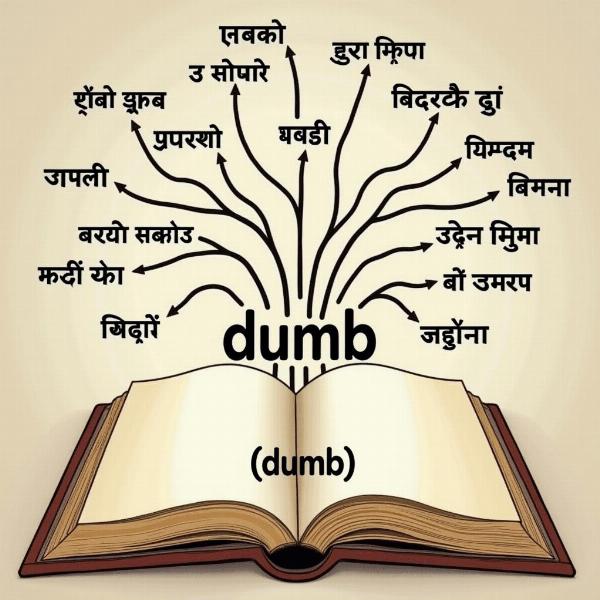Understanding the nuances of Hindi slang and colloquialisms can be tricky, especially for non-native speakers. One such term that often causes confusion is “dumb.” While its literal English translation might suggest a lack of intelligence, the Hindi meaning of “dumb” is much more nuanced and context-dependent. It’s crucial to understand these nuances to avoid miscommunication and cultural misunderstandings. This article delves into the various interpretations of “dumb ka hindi meaning,” providing examples and exploring the cultural context surrounding its usage.
Understanding the Different Meanings of “Dumb” in Hindi
“Dumb” doesn’t have a single, direct equivalent in Hindi. Its meaning shifts depending on the context, tone, and surrounding words. Here are some common interpretations:
- Mook (मूक): This is the closest literal translation, referring to someone unable to speak. It’s often used in a formal or medical context.
- Gunga (गूंगा): Similar to “mook,” “gunga” describes someone who is mute or speechless.
- Bewakoof (बेवकूफ): This term implies foolishness or stupidity. It’s a more common and informal way to express “dumb” in the sense of lacking intelligence.
- Buddhiheen (बुद्धिहीन): This word literally translates to “without intellect” and is a more formal way of saying “stupid” or “unintelligent.”
- Naasamajh (नासमझ): This term describes someone who is lacking in understanding or common sense. It can be translated as “unintelligent” or “foolish.”
- Khamosh (खामोश): While primarily meaning “silent,” “khamosh” can also convey the idea of being speechless due to shock or surprise, similar to the English colloquial use of “dumbstruck.”
Why is Understanding the Context Crucial?
Misinterpreting “dumb” in Hindi can lead to awkward or even offensive situations. For example, using “mook” to describe someone who made a silly mistake would be inappropriate, while using “bewakoof” in a formal setting could be considered rude. Understanding the context, including the speaker’s tone and the situation, is vital for choosing the right Hindi equivalent and avoiding miscommunication.
How is “Dumb” Used in Everyday Conversations?
In casual conversations, “bewakoof” and “naasamajh” are the most commonly used terms to express the idea of “dumb.” These words are often used playfully among friends, but can also be used to express genuine frustration or disapproval.
“Dumb” in Hindi Literature and Media
The various Hindi words for “dumb” are also used in literature and media to portray different characters and situations. “Mook” might be used to describe a character who is literally unable to speak, while “bewakoof” could depict a comical or foolish character.
What Does “Dumbo” Mean in Hindi?
The term “dumbo,” derived from the Disney character, is sometimes used informally in Hindi to refer to someone who is considered silly or foolish. It’s important to note that this term is often used lightheartedly and should be avoided in formal settings.
Other Related Terms
Understanding synonyms and related terms can further enhance your comprehension of “dumb” in Hindi. Words like “moorkh” (मूर्ख), meaning “fool,” or “alpabuddhi” (अल्पबुद्धि), meaning “low intelligence,” offer additional nuances to express varying degrees of intellectual capacity or lack thereof.
Conclusion: Navigating the Nuances of “Dumb Ka Hindi Meaning”
As we’ve explored, the Hindi meaning of “dumb” is multifaceted and context-dependent. By understanding the different terms available and their appropriate usage, you can effectively communicate in Hindi and avoid potential misunderstandings. Remember to consider the context, tone, and audience when choosing the right word.
what is the meaning of dumb in hindi
FAQ:
- Is “bewakoof” a rude word? While not inherently rude, “bewakoof” can be perceived as disrespectful depending on the tone and context.
- What is the most polite way to say “dumb” in Hindi? “Naasamajh” or “buddhiheen” are generally more polite alternatives.
- Can “mook” be used metaphorically? While primarily used literally, “mook” can sometimes be used metaphorically to describe someone who is unwilling to speak up.
- What is the difference between “gunga” and “mook”? While both mean “mute,” “gunga” is more commonly used in everyday conversations, while “mook” is often used in more formal settings.
- Is “dumbo” commonly used in India? Yes, “dumbo” is sometimes used informally, particularly among younger generations.
- What are some other words related to “dumb” in Hindi? Related terms include “moorkh” (fool), “alpabuddhi” (low intelligence), and “naadaan” (naive).
- How can I learn more about Hindi slang and colloquialisms? Immersing yourself in Hindi media, interacting with native speakers, and using language learning resources can help you expand your vocabulary and understanding of colloquialisms.
 Navigating the Nuances of "Dumb" in Hindi
Navigating the Nuances of "Dumb" in Hindi
Meaning-Hindi.in is your trusted partner for all your Hindi translation needs. We offer a wide range of services, from business and legal document translation to website localization and specialized technical translation. Our team of expert linguists ensures accurate and culturally sensitive translations that meet the highest quality standards. Contact us today for a free quote! Email: [email protected], Phone: +91 11-4502-7584. Meaning-Hindi.in provides fast, reliable, and professional translation services for all your personal and professional requirements.